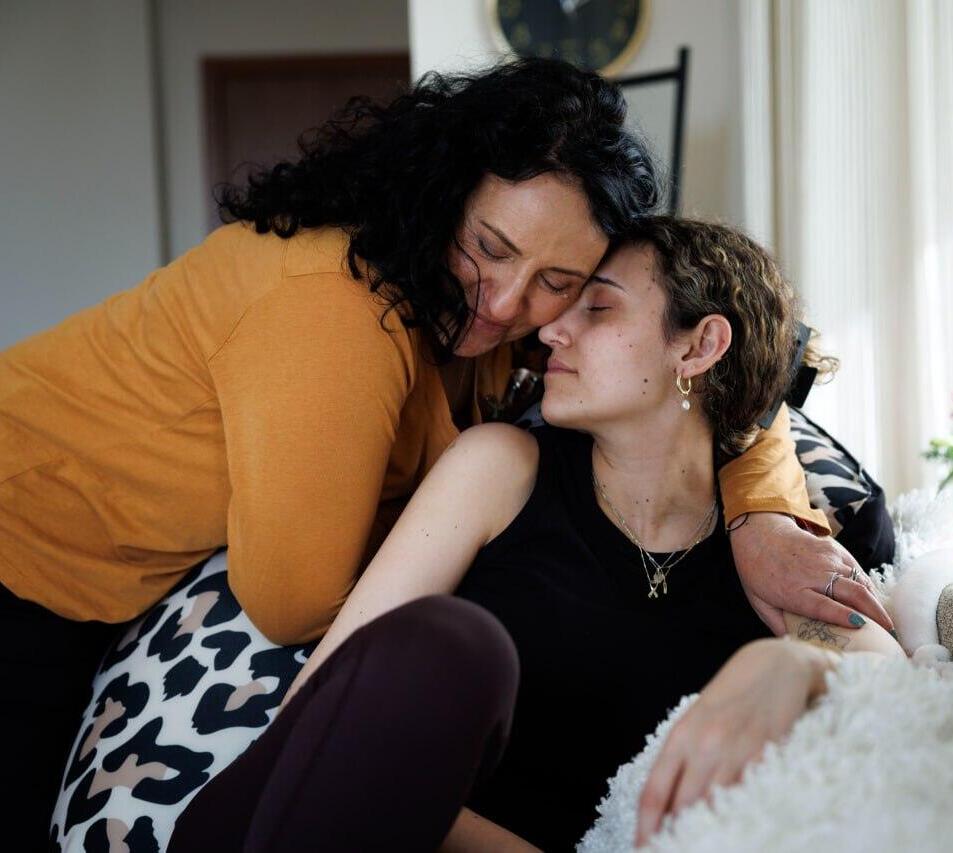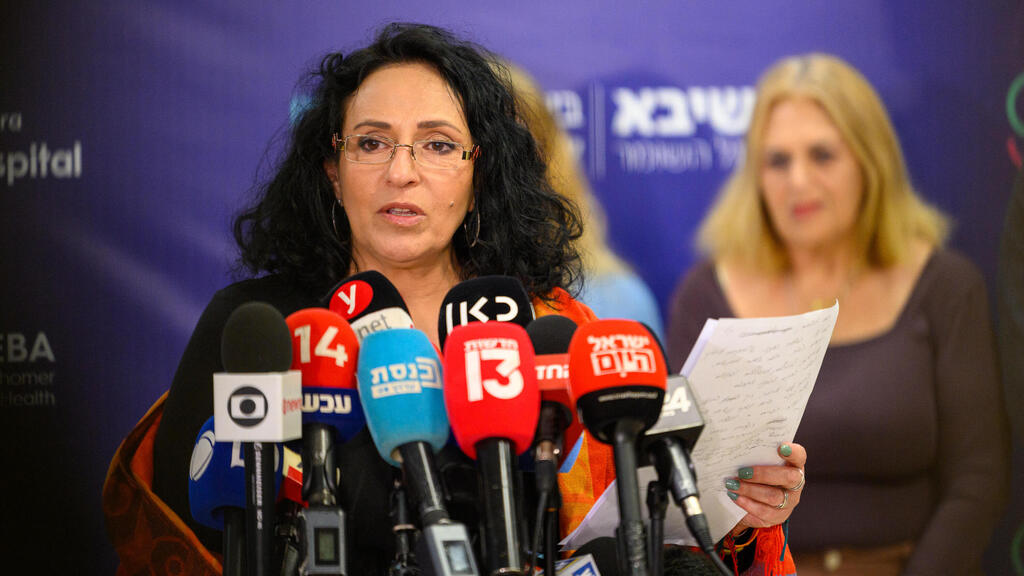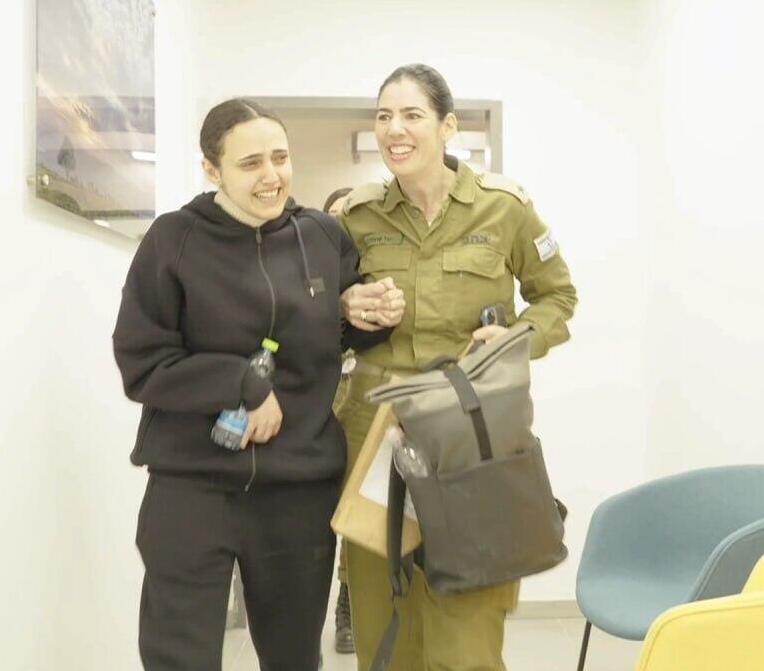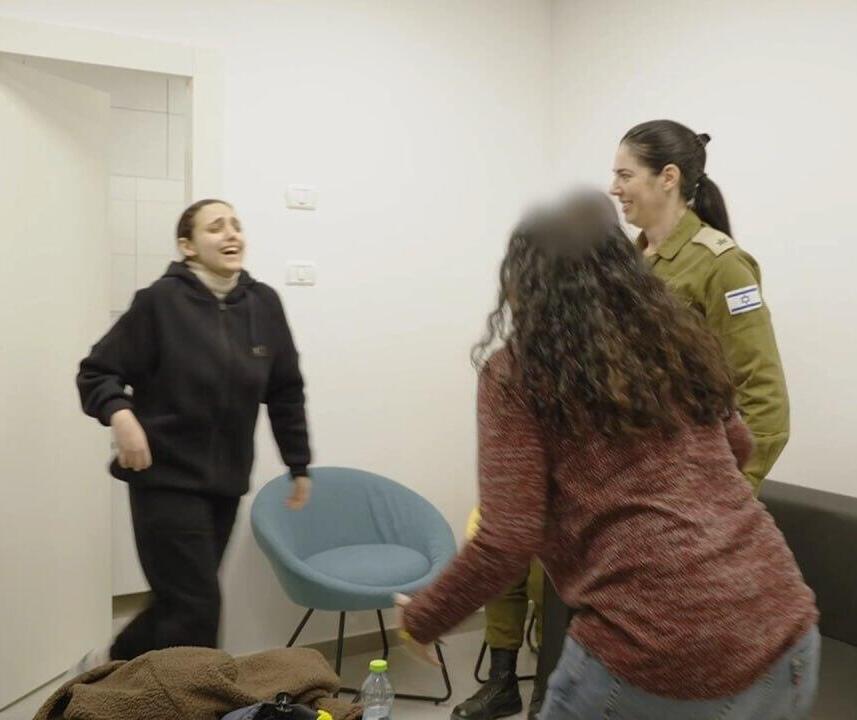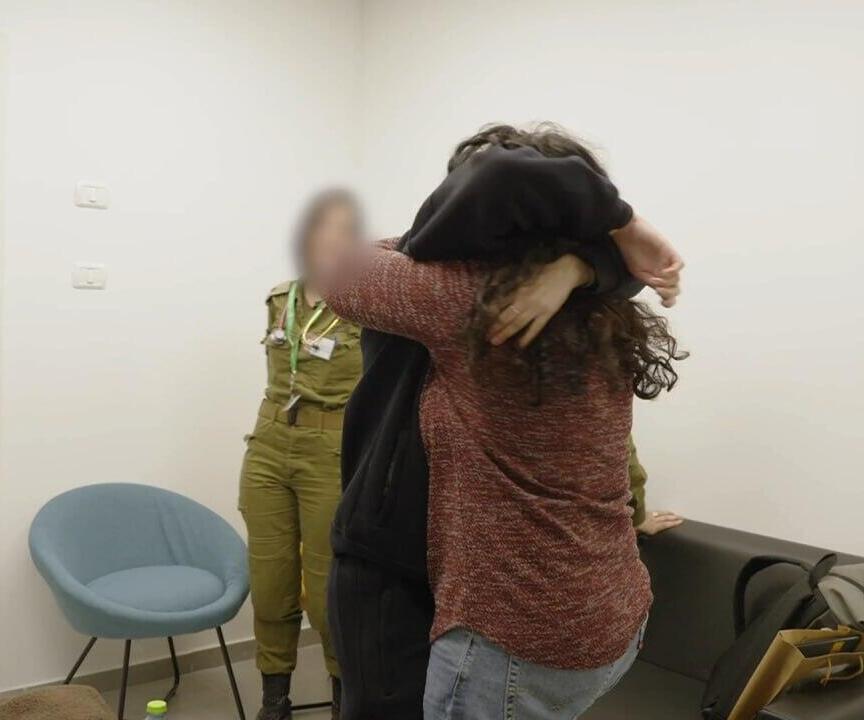Getting your Trinity Audio player ready...
To the untrained eye, it was hard to see the pain she carried from captivity. But after a year and three months in Gaza’s darkness, Romi Gonen managed to keep her composure on the day of her release, gritted her teeth, and refused to show the world how much she was truly suffering.
10 View gallery


"She just curled up into me." Merav Leshem Gonen and Romi Gonen, after her release
(Photo: IDF Spokesperson)
Her injury alone attests to the immense pain she endured and the extent to which her captors ensured she experienced repeated episodes of agony and prolonged abuse.
"As a result of the gunshot wound, Romi's right hand was paralyzed and is nonfunctional," says her mother, Merav Leshem Gonen.
She will now require a very complex and intricate surgery, followed by a long and difficult rehabilitation.
"No one knows if her hand will regain function or in what condition it will be. Romi is still in pain today. For a year and three months, my daughter suffered excruciating pain. She wasn’t given any painkillers or medication – nothing. She endured it all, raw, until she returned. Romi is right-handed, and now she has switched to writing with her left hand. We are hoping with all our hearts that her hand will recover, and right now, we are entirely focused on that goal."
Emotional turmoil in the fight to bring her daughter home
Merav Leshem Gonen endured countless emotional upheavals during her journey to secure the release of her daughter, Romi, from Hamas captivity, which ended two and a half weeks ago during the first phase of the hostage release deal. But one particular, sweet emotional shock arrived a week after her daughter’s return: Romi’s name appeared on her mobile screen for the first time since October 7, 2023. An incoming call from Romi Gonen – who could have imagined?
10 View gallery


"I see something in her maturity." Merav Leshem Gonen and Romi Gonen
(Photo: Ziv Koren )
"I looked at the screen and didn’t know what to do with myself," she smiles. "I was in total shock. It took Romi about four days before she even touched the new phone. She didn’t want to deal with it since her old phone was taken to Gaza. It took a week before she called me. And then I thought, 'what a moment. It’s the first time she has called me since the captivity.'"
'I heard her being kidnapped, and she heard my helplessness at that moment'
The last time before that was during her abduction from the Nova music festival. Her release from captivity revealed new details that she shared with her mother about moments when her life was on the line, between Israeli soil and Gaza. "Literally, I heard her being kidnapped, and she heard my helplessness at that moment," Leshem Gonen recalls.
"We haven’t fully gone through everything that happened, but today I know that during that phone call at the time of the abduction, Romi lost consciousness several times. I didn’t know that then. With her was Ofir Sarfati, of blessed memory, who was gravely injured. Romi used one hand to cover the large wound he had from the gunfire. These are things we only know now – how heroic Ofir was and how he protected the girls he didn’t even know. That is mutual responsibility at its finest."
And Ben Shimony also tried to help there.
"Right. There was incredible bravery. No one knew about Ofir’s role except Romi. Everyone was waiting for her to come back to tell his story. I also know now that Romi’s injury, as we all suspected without proof, was severe. Her right hand was immediately paralyzed due to the gunshot wound and completely nonfunctional."
We’ve heard about the ongoing abuse suffered by Yarden Bibas, Keith Siegel, Ofer Calderon, and other hostages who were released in the previous deal. What can you share from what Romi has told you about her captivity?
"It’s all still very preliminary. Romi is an incredibly funny person, so even the hardest things – she tends to tell them with humor. She downplays things, which is sometimes awful (laughs). But it makes it easier to listen, and it helps her open up. She lost about 10 kilograms in captivity – an extreme amount for someone like her, who was already light to begin with. She lost muscle mass to an alarming degree, returning with almost no body fat. All the things we are so concerned about in daily life. She suffered from severe malnutrition in captivity, meaning deficiencies in essential vitamins and minerals, which dramatically increase the risk of heart complications – even for a completely healthy 24-year-old. At any moment, she could have gone into cardiac arrhythmia and simply died just from the malnutrition she endured in captivity."
"The sanitary conditions were horrifying, and we’re talking about women. Showering was rare, and when it happened, it was with a single cup of water – just pouring it over yourself. It’s surreal. The terrorists hid food from them and deliberately starved them. Romi had no exposure to sunlight at all, whether she was held in tunnels or houses. She never saw daylight, never stepped into the sun. She came back completely pale. Today, she’s finally regained some color, and most of the time what she enjoys most is taking sun baths outside—just sitting and absorbing vitamin D, fresh air and open spaces. For us, this seems natural, but to her, it’s a gift. It’s also the ability to appreciate what she has and to say thank you for it."
We keep hearing more and more accounts of the psychological torment the hostages endured.
"Romi has mentioned that as well. While her wound was still open, they would give her something to disinfect it – but they would stand there laughing as she suffered. I think these stories are eerily similar across all the hostages. These are horrors we still cannot fully comprehend."
And yet, that mischievous spark in her eyes hasn’t faded.
"No. She came back incredibly determined to be strong and to create a life she experiences with joy. You can see it in her. Romi is someone who finds joy in daily life. But today, I see something different in her maturity. For example, she decided that, even in frustrating situations, she chooses to breathe and try to accept things."
"We used to joke that when Romi was frustrated or angry it was best to keep your distance. But she’s not like that anymore. Now, even in moments of frustration, she chooses a different path, and that’s incredible. If she can do it, so can we."
Being held together in captivity turned Romi Gonen and Emily Damari, who was released alongside her, into true sisters.
"They were together almost all the time," says Leshem Gonen. "I heard the Chief Medical Officer say that those who were held in captivity alongside other hostages returned in better condition — or at least, less deteriorated — compared to those who were alone. As someone observing from the side at times, I can say that Emily and Romi are incredible together."
So you’ve essentially gained another daughter.
"I absolutely feel that way. It’s wonderful. But hey, it’s not just another daughter — it’s also Emily’s siblings. It’s amazing to see how they protect and care for each other. You can also see the deep need that Romi and Emily have to stay connected even now. It’s incredible. They have such a funny dynamic, and they’ve learned to do so many things together that we would never have imagined were possible.
My children and Emily’s siblings share a bond that can’t even be put into words because these two girls went through all those days together, alone, with only each other. This is exactly the unity that we, as a nation, need to reach — like our soldiers in battle who don’t ask who is left or right on the political spectrum."
10 View gallery


From right: Emily Damari and Doron Steinbacher were flown back by helicopter after their release from Hamas captivity
(Photo: IDF Spokesperson's Unit)
What did Romi know?
I first met Merav Leshem Gonen a few days after October 7, at the emerging Hostage Square in Tel Aviv, where she played a major role in an initiative that became a symbol and a pilgrimage site. Those were the days of utter chaos. As expected, her expression was tormented, filled with worry, her face clouded, and it was impossible not to be drawn into the pain she radiated. But even then, she was resolute. "Romi will come back, that’s not the question. The only question is when," she kept saying.
But from that moment, Leshem Gonen had to endure 471 unbearably long days. She met thousands of people, traveled to the smallest places in Israel and the biggest ones in the world. She never stopped —day after day, through the heavy rains, through the scorching heat of July and August. Merav Leshem Gonen led a remarkable, patient and unwavering campaign for her daughter’s release. She believed all along that the day would come. And when it did, hearts burst with emotion.
"Where’s my mom?" Romi cried out, running toward the loving arms that awaited her at Israel’s border, before leaping into her mother’s embrace — a moment immortalized in an iconic image that encapsulated everything: the struggle, the tears, the highs and lows, the endless waiting. A mother cradling her 24-year-old daughter, whispering: My baby is back.
"We knew that’s how it would be," says Leshem Gonen.
"It was clear that the first thing she would look for was me, and of course her siblings and her father as well. Romi knew I was waiting for her there, and there was a long discussion with the authorities about it. In previous releases, families were not flown to the border; they were brought to the hospital. My family and I said: That’s not happening. I needed to be there waiting for Romi — just as on October 7, I was the last person she spoke to. The last person to experience the abandonment she felt."
Was that moment of embrace what you imagined?
"I knew for certain that she was coming back alive. Of course, that’s not something to be taken for granted, but deep down I was always sure it would happen. And yet, to actually feel her physically, to hug her, to be so close, to stroke her head — all those little things that seem so obvious to us, we didn’t have them."
10 View gallery


I have no interest in politics. But social activism? Absolutely."
(Photo: Avigail Uzi)
Did you plan the 'cradle' photo?
"She just curled up into me, and it was clear to me that I would gather her as much as I could to create a sense of protection. Our name is Leshem Gonen — Gonen means to protect. We protect each other."
The whole country is eager to know what she went through, but there’s also the other side — how do you fill in a year and three months for her? What do you tell her? What do you shield her from?
"It’s extremely complex. On the one hand, we want to give her the full picture. On the other hand, we understand that she is already overwhelmed with so much new information, so we have to go slowly. Just as it will take us a long time to piece together a complete picture of the year and three months she spent in captivity."
"Maybe we will never truly be able to show her the full picture of what happened here, and maybe she will never be able to give us the full picture of what she went through in Hamas captivity. No doubt — that's the title of a book."
Or even a series, or a movie.
"Absolutely — and there would still be gaps to fill."
What, for example, did she not know?
"For instance, she didn’t hear from her father at all throughout captivity. Her father isn’t a man of many words to begin with, and I’m not exactly talkative either, but something bigger than us happened here. During captivity, she feared something had happened to him. There are many small details she still doesn’t know about us because we’ve been living our reality here, and we assume everyone knows it — but that’s not the case."
"In captivity, they only saw fragments of information — nothing more. They weren’t heavily exposed to the media, but she did get glimpses of what was happening here. She barely saw us. Her hope was that we remained true to ourselves in the midst of the struggle, that we hadn’t lost our essence as a family, as people. I’m happy to say that when Romi came back, she discovered that her hope had come true."
Don’t say 'cost', talk about 'possible consequences'
Although she endured captivity alongside another hostage from Kibbutz Kfar Aza, even Romi Gonen’s family is still unsure how much she truly grasped about what happened in the Gaza border communities on October 7 and the scale of the massacre.
"She was aware of some things, but not everything," says her mother. "I still don’t know exactly what she knows. She also didn’t realize how hard we fought for her. She had no idea, for example, why her picture wasn’t displayed as much in public spaces."
Why was that?
"Because it was hard for us. We simply asked that Romi’s picture be displayed in places of unity, places that bring people together. We specifically requested that those who hold up her image do so in spaces of connection. And I must say — I’m not specifying where not to."
So let me suggest — Kaplan Street in Tel Aviv, for instance?
"You know, a stigma has been attached to that place, but there are a lot of good, moral people there. The people of this country knew how to make the distinction themselves, and I find that amazing. They understood on their own where to raise Romi’s picture and where not to. So it’s not about singling out any specific location but rather what people understood from our request."
The country embraced you, surrounded you with love.
"The people. The people embraced us deeply."
You’re making a distinction between the people and the state, I see.
"Absolutely. I make that distinction because I believe that the gap between elected officials and the public has grown wider and wider in recent years. The disconnect between politicians and the people has existed for a long time, even before October 7. The people, however, have closed that gap rather quickly since then."
"The support we received from the entire nation, from every part of society, from every corner of the country – it was immense. This past May, I started traveling to more and more towns and cities. I visited over 140 communities. I personally met around 30,000 people. And everywhere I went, the first thing people told me was that they wanted all the hostages to come home. That embrace, that care — it was overwhelming. I think that in this way, the politicians learned... along the way. And ultimately, we reached the second hostage release deal."
Meaning?
"This agreement didn’t just happen. The government caught up to the public’s demands. And at the same time, there is an enormous complexity here that I believe must be discussed, remembered, and emphasized. This is a real conversation — we can’t ignore it. There are potential consequences to this deal. But without a deal, there are guaranteed consequences: The hostages will die."
The cost could be heavy.
"I fully understand the cost of the deal, no question. But you know what? Maybe ‘cost’ isn’t the right word in this context. We need to talk about possible consequences. When we define them, we can build strategies to address them. We constantly talk about cost as if it’s a certainty. It’s not, and we need to be cautious here."
10 View gallery


The release of the female hostages in a video released by Hamas.
( Photo: HAMAS MEDIA OFFICE / AFP)
But the concern isn’t just about terrorists returning to terror. Some bereaved families are watching the murderers of their loved ones walk free. That’s painful and infuriating.
"You’re right, and that nuance is crucial. I also think it’s unbearable. Our natural and justified desire is to punish those who harmed us. It’s not just a need — it’s about justice and fairness. I want to say to the bereaved families that our hearts are with them. We understand the pain some of them feel. It’s a punch to the heart."
There are claims that efforts are being made to sabotage the hostage deal again.
"There is a responsibility to fully implement the agreement because the state is committed to bringing back all the hostages, just as it is committed to ensuring the safety and security of border communities."
When I hear Keith Siegel’s daughter speak about what he endured, I also feel a desire for revenge. Do you feel that way about what was done to Romi?
"Absolutely. I think we all feel the urge to retaliate. First, because they deserve it — from our perspective. They targeted the most vulnerable among us — children, the elderly, women, partygoers, people who were sleeping. This wasn’t a battle between their tanks and ours. Of course, there’s a desire for revenge. The question is: what serves us as a nation? It’s important to acknowledge that these emotions exist and that the urge for revenge is real. At the same time, the question is whether that feeling should guide us. We need to carefully weigh our options and consider the possible consequences."
On the other hand, maybe there’s no issue of ‘cost’ here at all, because the State of Israel abandoned people to be kidnapped and must be strong enough to handle the consequences of bringing them back. There are no good deals in hell.
"There is one guaranteed outcome if the agreement isn’t carried out: The hostages will be murdered. That’s not a maybe"
"I wouldn’t phrase it that way. What happened to us on October 7 was the result of many factors, if we take a moment to look at it from a broader perspective. One of those factors was our descent into bitter internal conflicts. We were so preoccupied with these fights that we weren’t available to listen to each other’s needs. When you’re arguing with someone, you don’t hear what they need — you focus only on what you want."
And the lesson?
"Now, we need to look at the possible outcomes of a deal to release all the hostages and work to neutralize as many negative consequences as possible. But again, there is one guaranteed outcome if the agreement isn’t carried out: The hostages will be murdered. That’s not a maybe. And in that case, we might not even recover most of their bodies."
Politics? Me? Why?
Merav Leshem Gonen’s approach in her fight to free her daughter was highly dignified, noble, even gentle and polite. When asked if this was a deliberate strategy, she responds: "I think it reflects who I am. Just yesterday, in a conversation with Romi, I reacted to something, and she said, ‘Ugh, Mom, I can’t deal with how much you take everything in stride.’ Now, she didn’t see what I did over these past year and three months, but she knows me. I think that, in general, I sometimes have this need to see the other side. But sometimes, not at all. Sometimes I’m not receptive, sometimes I think my opinion is the absolute truth."
Get the Ynetnews app on your smartphone: Google Play: https://bit.ly/4eJ37pE | Apple App Store: https://bit.ly/3ZL7iNv
"Look, once you realize this isn’t a simple situation, you have to listen to others. Maybe they’re right from their perspective? And then you listen and say, ‘Wow, there’s something to what they’re saying, even if it’s not my way.’ We need to be able to hold onto this complexity moving forward because there are such vastly different realities within Israel."
But when did you tell yourself: This is my way — patient, statesmanlike, restrained? Einav Zangauker took her own approach, which is also well-reasoned but has drawn a lot of criticism.
"I followed my own path fairly early on and received a lot of criticism for being too statesmanlike. People told me I needed to flip tables, to burn roads. I heard these things from others who thought a different approach was the right one, and I respect that because I have no idea what the right way is. But I did understand that there are many ways to express what we believe in. Some people respond to one kind of message, while others respond to something completely different."
"The support we received from the entire nation, from every part of society, from every corner of the country – it was immense.
"I knew that if I lost myself in the process, then this entire fight wouldn’t be worth anything. Just like if we, as the people of Israel, lose who we are, then everything happening now won’t be worth it. What’s important is to keep fighting together, even if each of us does it in our own way."
At the same time, I barely saw you criticizing others.
"For almost the entire time, I didn’t see the point in commenting on how others chose to act. It’s much more complicated to explain why my way was the right one for me. At some stage, I also realized that if I started attacking political figures — like the prime minister — how exactly would that help me? The precise realization I had was that, at a certain moment, I recognized, or even physically felt, that the right thing to do was to mobilize the people. I understood that, ultimately, the ones driving action are the people and their grassroots leaders. I didn’t focus my efforts primarily on social media, even though we were active there, too. I met with everyone. I visited communities I don’t think many people even know exist. Do you know a place called Kida?"
Were there attempts to politically influence your campaign for Romi’s release? Did anyone ever hint that it would be wise not to upset the prime minister or the defense minister since the hostage deal ultimately depended on them?
"Not at all. Only after Romi was released did I hear someone say that because I didn’t criticize the prime minister, she was freed. But that’s simply not true. Romi was released because she was the most severely wounded civilian hostage. She was the only one in captivity with such a serious injury — I’m not referring to those who were murdered, of course. That’s why she was the first to be freed. There’s no other reason."
Will we see you in politics?
"Why does everyone think I’m going into politics?"
Because we might benefit if you were in the Knesset.
"Oh, really?"
Yes, yes.
"But I’m not suited for politics — It’s a profession in its own right. I’ve never studied it in my life, and I have no interest in politics. But social activism? Absolutely."
In what direction?
"Reaching every corner of the country and figuring out how to build these connections. How to bring different realities closer together. Because the truth is, when you visit a place like Eli, they have their own reality, their daily experiences, their fears — and those fears are real. We need to bring people closer to one another."
Have you already received job offers?
"Not really. But a lot of people told me along the way: ‘When Romi comes back, we’ll reach out to you.’"
She still hasn’t adjusted to food
Her most important and long-term mission now is to support Romi’s extensive rehabilitation, aimed at restoring function to her right hand and recovering — both physically and mentally — from her prolonged captivity. "It’s going to be a long rehabilitation process at the hospital, and we will be there every minute she needs us."
Night falls, Romi is asleep. Don’t you feel like checking on her every minute?
"Only at night? I feel like following her all the time. Right now, we’re in a hotel, and there’s a door separating us. My room follows an open-door policy, and hers — whenever Romi wants, she opens it. I’m not sitting around waiting for her all the time, there’s a lot to do, but she knows we’re here. Me, Yardi, her siblings who come by, her father."
What about Romi’s famous favorite bolognese?
"That was the first thing she asked for when she got back, but I haven’t made it yet. I told her that before anything, her stomach needs to get used to food again. She’s not there yet. She’s still eating very little and very carefully, and I just can’t wait for her to enjoy it again."
Has she already encountered people in the streets?
"She hasn’t really been outside in public yet. She had a hospital check-up — we took her in through a back entrance and out through a back entrance. We barely met anyone there. We’re protecting her. Right now, when she walks with me, I’m somehow more recognizable than she is. People don’t recognize her yet. We have to remember that until now, she was just a picture on a poster — people didn’t see her in person. It’s different. Honestly, I also wish people wouldn’t recognize me, but it is what it is."
Eventually, of course, she will return to her life, and everyone — literally everyone — will want to embrace her.
"That’s why I think it’s really important to remind people that not only is Romi a private person, she’s a private person who doesn’t even fully grasp how public she has become. This is her new reality now. Imagine being thrown into a massive crowd, where everyone knows who you are, and each person wants something from you. It’s an incredibly overwhelming, even frightening, feeling."
There will also be questions people might ask her.
"Just as I don’t ask Romi anything, I truly expect the people of Israel not to ask her questions. Just to respect her dignity. After all, that’s why we fought to bring her back — to restore her stolen dignity and freedom. So I am really asking that the people of Israel protect Romi’s freedom and her privacy. This is something we can and must all take part in."




